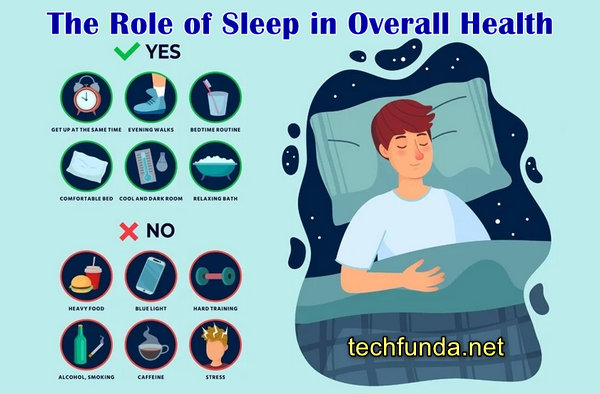In our fast-paced modern world, sleep often takes a backseat to the demands of daily life. However, the significance of quality sleep cannot be overstated. It plays a vital role in our physical and mental well-being, allowing our bodies to rest, rejuvenate, and repair. In this comprehensive guide, we will explore the fascinating intricacies of sleep and its profound impact on our overall health. From the latest scientific research to practical tips for improving sleep habits, we invite you to embark on this journey towards a healthier and more fulfilling life.
The Science Behind Quality Sleep
To truly understand the importance of sleep, we must delve into the latest research findings. We will uncover the intricate mechanisms that govern our sleep-wake cycles, exploring the different stages of sleep and their functions. Armed with this knowledge, we can begin to appreciate the profound impact that sleep has on our physical and mental performance.
Sleep and Physical Health
Sleep is not merely a state of rest; it is a fundamental pillar of our physical health. We will delve into how sleep impacts vital body functions such as immune function, metabolism, cardiovascular health, and hormone regulation. By understanding these connections, we can appreciate the far-reaching implications of quality sleep on our overall well-being.
The Cognitive Connection: Sleep and Mental Health
The relationship between sleep and mental health is undeniable. We will unravel the intricate links between sleep and brain function, exploring how sleep deprivation can impair cognitive processes, emotional regulation, and mental resilience. Understanding these connections is crucial for fostering optimal mental health and well-being.
Sleep Hygiene: Tips for a Restful Night
Practical strategies for better sleep are essential for achieving restorative and refreshing slumber. We will delve into the concept of sleep hygiene and provide evidence-based tips for creating a sleep-friendly environment, establishing a relaxing pre-sleep routine, and promoting healthy sleep habits.
Common Sleep Disorders: Recognizing and Addressing Them
Sleep disorders can profoundly impact our quality of life. We will shed light on common sleep disorders such as insomnia, sleep apnea, restless legs syndrome, and narcolepsy. By recognizing the signs and symptoms, we can seek appropriate diagnosis and treatment, ensuring restful and rejuvenating sleep.
Sleep and Longevity: Can Quality Sleep Prolong Your Life?
The relationship between sleep and aging is a topic of great interest. We will explore the intriguing connections between sleep duration, sleep quality, and longevity. By optimizing our sleep habits, we may unlock the potential for a longer, healthier, and more fulfilling life.
You can also read: 10 Simple Habits for Better Health
The Role of Sleep in Stress Management
Sleep and stress share a complex bidirectional relationship. We will uncover how sleep impacts our stress levels and explore practical strategies for using sleep to alleviate stress. By prioritizing quality sleep, we can enhance our resilience and improve our ability to cope with the challenges of daily life.
Optimizing Your Sleep Environment
Creating the ideal sleep environment is essential for achieving restful nights. We will provide practical tips for optimizing your sleep space, including recommendations for light exposure, temperature regulation, noise reduction, and creating a comfortable sleep environment.
Latest Innovations in Sleep Technology
The world of sleep technology is constantly evolving, offering innovative tools and gadgets to monitor and enhance our sleep. We will explore the latest advancements in sleep-tracking devices, smart mattresses, and sleep apps, empowering you to leverage technology for better sleep.
Sleep and Nutrition: A Holistic Approach to Well-being
The connection between sleep and nutrition is undeniable. We will examine how diet influences sleep patterns and explore the impact of specific nutrients on sleep quality. By adopting a holistic approach to well-being, we can optimize both our dietary choices and sleep habits for optimal health.
Practical Tips for Improving Sleep Habits
Simple lifestyle changes can have a profound impact on our sleep quality. We will provide practical tips for improving sleep habits, including establishing a consistent sleep schedule, creating a relaxing bedtime routine, and managing external factors that may disrupt sleep.
Personal Sleep Stories: Real-life Experiences and Transformations
Real-life stories have the power to inspire and motivate. We will share personal narratives of individuals who have transformed their health and well-being through improved sleep habits. These stories serve as a reminder that quality sleep is within reach and can profoundly impact our lives.
Q&A with Sleep Experts: Answering Your Burning Questions
In this section, we’ll present some of the most commonly asked questions about sleep, answered by our panel of sleep experts.
Q: What is the recommended amount of sleep for adults?
A: Most adults need around seven to nine hours of sleep per night, according to the National Sleep Foundation. However, individual needs may vary, and some people may require more or less sleep to function optimally.
Q: How does alcohol affect sleep?
A: Contrary to popular belief, while alcohol can help you fall asleep faster, it can disrupt your sleep cycles. It can reduce the quality of your sleep and lead to frequent awakenings during the night.
Q: What is ‘sleep hygiene’?
A: Sleep hygiene refers to healthy habits and practices that help promote better sleep. This includes maintaining a regular sleep schedule, creating a sleep-friendly environment, and avoiding behaviors that can disrupt your sleep, such as consuming caffeine close to bedtime.
Q: How can I deal with insomnia?
A: Insomnia can often be addressed through lifestyle changes, such as improving sleep hygiene, managing stress, and maintaining a healthy diet and exercise routine. In some cases, cognitive behavioral therapy for insomnia (CBT-I) may be recommended. If insomnia persists, consult a healthcare provider, as it may be a symptom of an underlying condition.
Q: Can diet impact sleep?
A: Yes, your diet can significantly affect your sleep. Certain foods and drinks, such as those containing caffeine and alcohol, can interfere with sleep. On the other hand, nutrients like magnesium and tryptophan can promote better sleep. It’s also advised to avoid large meals close to bedtime.
In the following sections, we will delve deeper into these topics and more. Continue reading to uncover the science of sleep and discover practical strategies for achieving restful nights and healthier days.
Conclusion:
As we conclude this comprehensive guide, we summarize the key takeaways and encourage you to take action. By prioritizing quality sleep, fostering healthy sleep habits, and seeking professional guidance when necessary, you can empower yourself to enhance your overall health and well-being.
Remember, sleep is not a luxury but a fundamental pillar of a healthy and fulfilling life. Embrace the power of sleep, and let it become the foundation upon which you build a vibrant, energetic, and resilient self.

